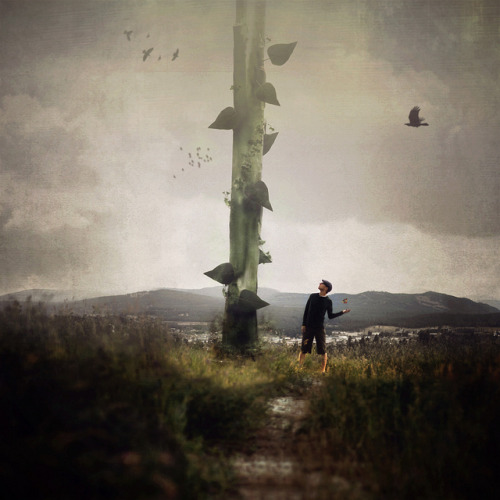This is my child, he said. I wash a dead man's brains out of his hair. That is my job.
This quote suggests that the novel centres around the theme of death as morbid words such as 'dead man' and 'brains' are used to symbolise mortality, hinting that death is a regular occurrence and not unusual shown by the flat, unsurprised tone used. The relationship between the child and the parent seems strained as he refers to him as 'my child' rather than his actual name, suggesting they don't get on well because not using his name sounds impersonal. Looking after a child should be seen as a natural thing but referring to washing his hair as a 'job' shows it is something he has to do, not a choice as a father. The story is told from an outsider's viewpoint with reported speech, however speech marks and punctuation is rarely used, possibly to symbolise how the road is an endless journey and punctuating the text would give it endings.
Yes I am, he said. I am the one.
The tone in which the man speaks is expressionless and cold, reflecting the way he feels towards the likelihood of their survival. The novel appears to be very emotionless and segregates the man from any other people as he is 'the one' and nobody else. The theme of isolation is present throughout this quote and the short syllables used are short and on their own, reflecting the idea of loneliness. A sense of blame is also felt throughout this sentence as if he is admitting to something because of the flat and depressing tone in his voice.
Tomatoes, peaches, beans, apricots. Canned hams. Corned beef.
The use of lists throughout this sentence emphasise the important of food to them, suggesting they have been without it for some time to be excited over such random foods. The use of commas and full stops here express their wonder and awe at the different foods as they are amazed to find any, hinting that trying to survive is a common problem they often face. The type of food is strange and does not really fit together, showing their poverty as they have to eat what they can find and not be fussy. The fact that the ham is canned (and all the other food is also likely to be canned) hints that something major has happened to reduce the amount of readily available food if only canned food is what they have access to.
Are we still the good guys, he said.
This question features the word 'still', suggesting that when they once were the good guys, something negative has happened to alter the speaker's opinion on themselves and place doubt into his mind. The lack of a question mark in the sentence presents the idea that he is not really expecting an answer, showing that the speaker and the listener do not have the strongest of relationships if their conversation is very limited. The phrase 'good guys' suggests that there are only two types of people in the world, the good guys and the bad, there is no middle ground. This sense of finality suggests that the speaker does not believe that people can do bad and good things without being categorized into either section, showing that he has strict morals and ideas of right or wrong.
We should go, Papa, he said. Yes, the man said. But he didn't.
The boy saying 'we should go' hints that there is a strong element of danger if he is suggesting they leave, and the man agreeing echoes this worry further. Their relationship is not very trusting as the man does not listen to the boys concerns and dismisses them in favour of what he would prefer to do. The short sentences suggest impatience between each of them and again reflects the fear and isolation they are experiencing. Danger is a very evident theme presented by this quote but bravery is also shown as the man feels they are able to face whatever is causing the boy to worry by not leaving.
The snow fell nor did it cease to fall.
This sentences features no punctuation in the middle of it, reflecting how the snow did not pause or stop for anything. The snow could symbolise their bad luck or misfortune as it never ends and is constantly pushing them further to their limits in order to survive. The fact that snow is cold reflects the coldness in their relationship and throughout the novel as a whole.
Okay? Okay.
Again, the short sentences used reflect how the relationship between the man and the boy is short and direct, there is not much room for unnecessary conversation. The short words also symbolise how little energy they have from travelling constantly and having so little to eat, suggesting that the situation is really taking it's toll on the characters as they can only manage minimal conversation.
They sat on the edge of the tub and pulled their shoes on and them he handed the boy the pan and soap and he took the stove and the little bottle of gas and the pistol and wrapped in their blankets and they went back across the yard to the bunker.
This sentence features no punctuation, describing their actions as they do them to depict exactly how it felt to be in their situation. They have to carry a pistol with them, emphasising the theme of constant danger and how they are always kept in the unknown as to what is around the corner. The way the pan is described as 'the' pan, rather than 'a' pan describes their extreme poverty as they can only afford one cooking utensil, this is echoed with the majority of their items which shows the reader how there is literally nothing left in this desolate place.
Tolling in the silence the minutes of the earth.
The Earth as we know it is never silent, so using that word to describe how it is now creates an eerie and creepy atmosphere because if the world is silent, there is literally nothing else except them, no humans or creatures. We are forced to empathise with the loneliness the characters must be feeling and the sentence uses soft words and sounds which highlight the quietness of the world.
She was gone and the coldness of it was her final gift.
This sentence describes how the boy's mother left them, describing her departure as a 'gift', suggesting her leaving was a good thing because she was no longer a burden to them anymore. The coldness being the gift suggests that she is responsible for the expressionless and harsh relationship the boy and the man share as between them she probably kept them together as a family but now they are alone. The sentence sounds very final and matter of fact, with the phrase 'she was gone' telling it how it is. This shows the reader that the man is under no illusions to how the world is and understands that he has lost many things important to him.
 There it stood. Towering over the house stood a huge green tunnel leading to the heavens. The empty sky was cloudy and emotionless. Vines and leaves engulfed the sculpture. Contorted around it's body. The boy rose from his bed. Remembering being sent there the previous night. A punishment for his worthless trade. The beans. Sprawling around it's cylindrical trunk lay the stems. He ran outside. Towards it. Admiring it's height and complexity. Fascinated.
There it stood. Towering over the house stood a huge green tunnel leading to the heavens. The empty sky was cloudy and emotionless. Vines and leaves engulfed the sculpture. Contorted around it's body. The boy rose from his bed. Remembering being sent there the previous night. A punishment for his worthless trade. The beans. Sprawling around it's cylindrical trunk lay the stems. He ran outside. Towards it. Admiring it's height and complexity. Fascinated.  -->
-->




